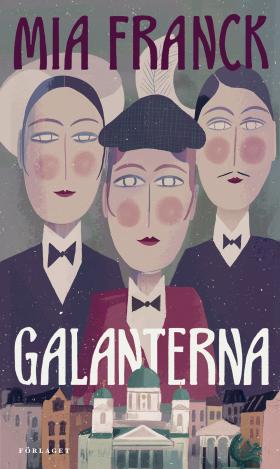
Galanterna
(Gallantry)
by Mia Franck
reviewed by Margaret Dahlstrom
Galanterna (Gallantry) is Mia Franck’s fifth novel. Her fourth, Bombträdgården (Bomb Garden), was nominated for Finnish and European literary prizes, and she has won a prize for her work in teaching writing.
Galanterna shows life in Helsinki in 1912 as excessively restrictive for young women. They are limited not only in the kinds of employment available to them and the money they can earn, but also in their leisure activities. Out together in the evenings they attract unwanted attention and advances from men, and are not welcome in restaurants as groups of women only.
Dagmar, Hilma, Ebba and Klara, close friends, discuss this and decide to try dressing as men when they go out. This is not a case of transgender identities, but simply a desire for more freedom: these girls just wanna have fun. They break more than one kind of social norm to get what they want: their incomes do not stretch to additional outfits, and they barely hesitate before stealing clothing and accessories they need for their disguises. And it doesn’t end there: Dagmar and Hilma continue with petty and not-so-petty theft, in an unplanned, opportunistic way.
Social life is a lot easier in their new outfits. Clothes make the man, and over time and with practice they feel increasingly comfortable and confident as men.
Dagmar, a milliner, is sent by her employer to learn from the fashion houses of Stockholm and Paris. She takes Hilma as a travelling companion. In both cities they experience the night life as Romeo and Hjalmar, their male alter-egos. But a chance encounter in Paris leads to involvement with a rough and sometimes violent gang, and they find themselves in considerable danger. This is a pivotal experience, and the two friends return to Helsinki.
Throughout the novel, the narrative focus is on Dagmar, but Hilma has almost equal billing because she is the centre of the group of friends, a leader, a strong personality, and someone Dagmar looks up to. (‘What would Hilma do?’ she wonders in a difficult situation). The danger they have faced affects them both profoundly, but they react quite differently. Dagmar abandons her male persona completely, and returns home as herself – older and wiser, but accepting a conventional female role. Hjalmar rejects his Hilma side and embraces his male identity permanently. Back in Helsinki, Hjalmar engages in escalating criminal behaviour – no longer petty theft, but violent robbery.
So the narrative does not resolve consistently with the feminist Bildungsroman it initially seems to be. In fact any feminist reading is stopped in its tracks by the two characters’ choices. Equally, neither outcome seems to satisfy the expectations of any form of Bildungsroman.
The narrative goes deeper than an account of what is, in effect, a social experiment by the women. The final chapter highlights questions which have been quietly apparent throughout the work: the nature and strength of the bonds between friends, and how far these bonds can be stretched.
The characters are sympathetically portrayed, albeit in a warts-and-all way. There are instances of deceit and disingenuousness at various levels and on the part of several characters, but whether these are justified by particular circumstances is left to the reader to judge, or not.
The setting is evoked not only by the narrative itself; historical colour is also provided by the inclusion of selected newspaper articles from 1912, placed strategically between chapters of the narrative. Among these, some recount significant world events, such as the sinking of the Titanic; others flesh out the theme of the changing social situation of women, through reports of the Suffragette movement, and an account of a record-breaking flight by a woman pilot. There are photos, too, of some characters, explained in the author’s Afterword, which provides a thumbnail backstory, while not undermining the fictional nature of the work.

Galanterna
Förlaget, Finland, 2021.
360 pages.
Foreign Rights: Rights & Brands, Helsinki.
Mia Franck is a Helsinki-based author with a doctorate in comparative literature who also teaches creative writing. Galanterna is her fifth novel. Her previous book, Bombträdgården (Bomb Garden) was nominated for the EU Book Prize and VI’s literature prize.
